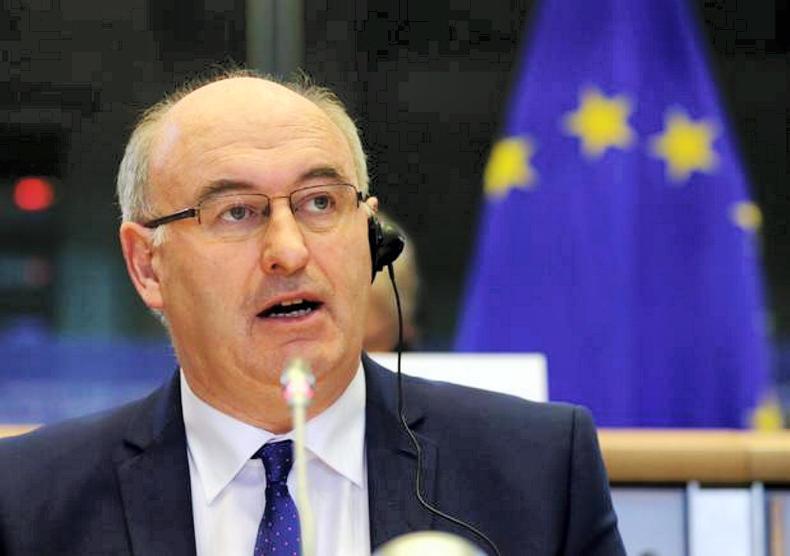European Commissioner for Agriculture and Rural Development Phil Hogan has said that he hoped glyphosate would be reauthorised in the coming weeks for a period of at least 10 years. He was discussing the future of the ingredient used in herbicides such as Monsanto’s Roundup at the European Economic and Social Council ahead of the chemical’s licence expiry at the end of this year. Commissioner Hogan’s office clarified to the Irish Farmers Journal that the comments represented his consistent view on glyphosate. However, the European Commission has not yet formed its proposal on the chemical’s reauthorisation.
Glyphosate had previously been authorised for 15 years. The Commission decided on an interim 18-month authorisation last June after its experts and those mandated by member states failed to agree a common position amid conflicting scientific reports and campaigns on potential links between glyphosate and cancer.
The temporary authorisation was granted to allow the European Chemicals Agency (ECHA) to report on its toxicity. ECHA’s committee for risk assessment concluded last month that glyphosate does not cause cancer, mutations or issues for human reproduction but has yet to publish its full report. The chemical remains classified as toxic to aquatic life and causing serious eye damage.
A European citizen’s initiative started on 25 January to “ban glyphosate and protect people and the environment from toxic pesticides” had just under 690,000 signatures this week. The initiative was started by environmental organisations, alternative farming organisations and consumer bodies around Europe and proposes to set EU-wide mandatory reduction targets for pesticide use. It also calls for the EU’s chemical approval process to be “based only on published studies, which are commissioned by competent public authorities instead of the pesticide industry”. If the initiative collects more than 1m signatures within one year, the European Commission must consider legislation along those lines, and explain why it decides to follow it or not.
Farmers have recently taken to social media to counter the campaign against glyphosate, using the hashtag #glyphosateisvital. NFU Scotland has been spearheading the effort, arguing that the chemical benefits food self-sufficiency, and reduces fossil fuel use through lower tillage and grain-drying needs.
Read more
Full coverage: glyphosate
European Commissioner for Agriculture and Rural Development Phil Hogan has said that he hoped glyphosate would be reauthorised in the coming weeks for a period of at least 10 years. He was discussing the future of the ingredient used in herbicides such as Monsanto’s Roundup at the European Economic and Social Council ahead of the chemical’s licence expiry at the end of this year. Commissioner Hogan’s office clarified to the Irish Farmers Journal that the comments represented his consistent view on glyphosate. However, the European Commission has not yet formed its proposal on the chemical’s reauthorisation.
Glyphosate had previously been authorised for 15 years. The Commission decided on an interim 18-month authorisation last June after its experts and those mandated by member states failed to agree a common position amid conflicting scientific reports and campaigns on potential links between glyphosate and cancer.
The temporary authorisation was granted to allow the European Chemicals Agency (ECHA) to report on its toxicity. ECHA’s committee for risk assessment concluded last month that glyphosate does not cause cancer, mutations or issues for human reproduction but has yet to publish its full report. The chemical remains classified as toxic to aquatic life and causing serious eye damage.
A European citizen’s initiative started on 25 January to “ban glyphosate and protect people and the environment from toxic pesticides” had just under 690,000 signatures this week. The initiative was started by environmental organisations, alternative farming organisations and consumer bodies around Europe and proposes to set EU-wide mandatory reduction targets for pesticide use. It also calls for the EU’s chemical approval process to be “based only on published studies, which are commissioned by competent public authorities instead of the pesticide industry”. If the initiative collects more than 1m signatures within one year, the European Commission must consider legislation along those lines, and explain why it decides to follow it or not.
Farmers have recently taken to social media to counter the campaign against glyphosate, using the hashtag #glyphosateisvital. NFU Scotland has been spearheading the effort, arguing that the chemical benefits food self-sufficiency, and reduces fossil fuel use through lower tillage and grain-drying needs.
Read more
Full coverage: glyphosate






 This is a subscriber-only article
This is a subscriber-only article










SHARING OPTIONS: